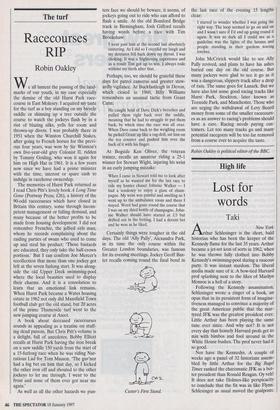The turf
Racecourses RIP
Robin Oakley
We all lament the passing of the land- marks of our youth, in my case especially the demise of the old Hurst Park race- course in East Molesey. I acquired my taste for the turf as a boy standing on my bicycle saddle or shinning up a tree outside the course to watch the jockeys flash by in a riot of blazing silks, yells for room and thrown-up divots. I was probably there in 1951 when the Winston Churchill Stakes, after going to French horses for the previ- ous four years, was won by Sir Winston's own five-year-old grey Colonist II, ridden by Tommy Gosling, who won it again for him on High Hat in 1961. It is a few years now since we have had a prime minister with the time, interest or spare cash to indulge in racehorse ownership.
The memories of Hurst Park returned as I read Chris Pitt's lovely book A Long Time Gone (Partway Press, £26), a history of the 90-odd racecourses which have closed in Britain this century, some through incom- petent management or falling demand, and many because of the better profits to be made from housing development. I did not remember Frenchie, the jellied eels man, whom he records complaining about the raiding parties of swans who used to come up and steal his product: 'Those bastards are educated, they only take the half-crown portions.' But I can confirm Joe Mercer's recollection that more than one jockey got left at the seven furlong start. It was along- side the old Upper Deck swimming-pool where the local beauties used to display their charms. And it is a consolation to learn that an emotional link remains. When Hurst Park became a Wates housing estate in 1962 not only did Mansfield Town football club get the old stand, but 20 acres of the prime Thameside turf went to the new jumping course at Ascot.
A book about deceased racecourses sounds as appealing as a treatise on stuff- ing dead parrots. But Chris Pitt's volume is a delight, full of anecdotes. Bobby Elliott recalls at Hurst Park having the iron break on a new saddle 150 yards from the start of a 15-furlong race when he was riding Nar- ratious Lad for Tom Masson. 'The guv'nor had a big bet on him that day, so I kicked the other iron off and shouted to the other jockeys to let me through. I went to the front and none of them ever got near me again.'
As well as all the other hazards we pun- ters face we should be beware, it seems, of jockeys going out to ride who can afford to flash a smile. At the old Bomford Bridge track in Birmingham, Josh Gifford recalls having words before a race with Tim Brookshaw:
I went past him at the second last absolutely cantering. As I did so I overdid my laugh and my dentures fell back down my throat. I was choking. It was a frightening experience and as a result Tim got up to win. I always rode without my teeth after that.
Perhaps, too, we should be grateful these days for patrol cameras and greater stew- ardly vigilance. At Buckfastleigh in Devon, which closed in 1960, Billy Williams remembers an unusual tactic from Grant Cann:
He caught hold of Dave Dick's breeches and pulled them right back over the saddle, meaning that he had to struggle to put them back, by which time the race was all over. When Dave came back to the weighing room he picked Grant up like a rag-doll, sat him on the tea counter and pushed him over the back of it with his finger.
At Bogside Ken Oliver, the veteran trainer, recalls an amateur riding a 25-1 winner for Stewart Wight, injuring his wrist in an early jumping mistake: When I came in Stewart told me to look after myself as he wanted me for the last race to ride my hunter chaser Johnnie Walker — I had a tendency to enjoy a glass of cham- pagne. My wrist was painful and swelling so I went up to the ambulance room and there I stayed. Word had gone round the course that I was on my third bottle of champagne. John- nie Walker should have started at 1/3 but drifted out in the betting. I had a decent bet and he won as he liked.
Certainly things were tougher in the old days. The old 'Ally Pally', Alexandra Park, in its time the only course within the Greater London boundaries, was famous for its evening meetings. Jockey Geoff Bax- ter recalls coming round the final bend in Custer's First Stand. the last race of the evening 15 lengths clear:
I started to wonder whether I was going the right way. The loop seemed to go on and on and I wasn't sure if I'd end up going round it again. It was so dark all I could see as a guideline was the lights of the houses and people standing in their gardens waving torches.
John McCririck would like to see Ally Pally revived, and plans to have his ashes buried one day on the old course. But many jockeys were glad to see it go as it was a dangerous, slippery track after a drop of rain. The same goes for Lanark. But we have also lost some good racing tracks like Hurst Park, Stockton, later known as Teesside Park, and Manchester. Those who are urging the withdrawal of Levy Board money from some of the smaller racecours- es as an answer to racing's problems should have a care. Racing needs paying cus- tomers. Let too many tracks go and many potential racegoers will be too far removed from a course ever to acquire the taste.
Robin Oakley is political editor of the BBC.


























































 Previous page
Previous page